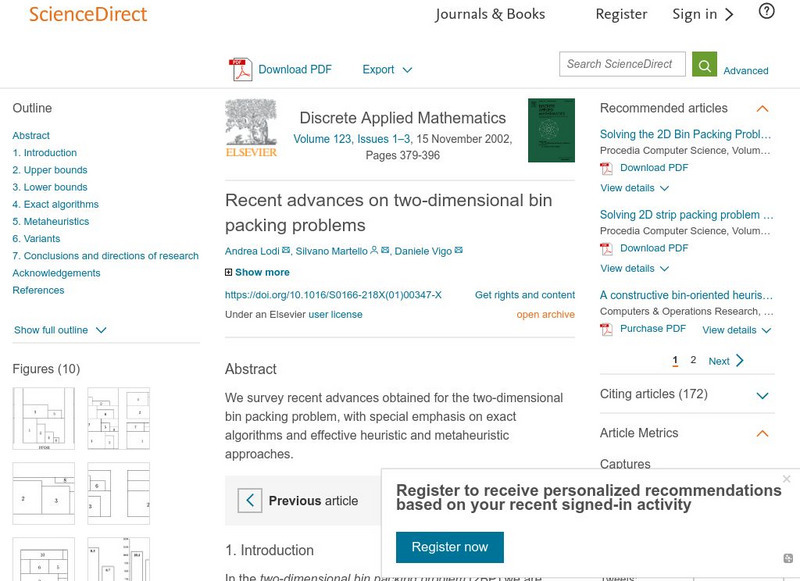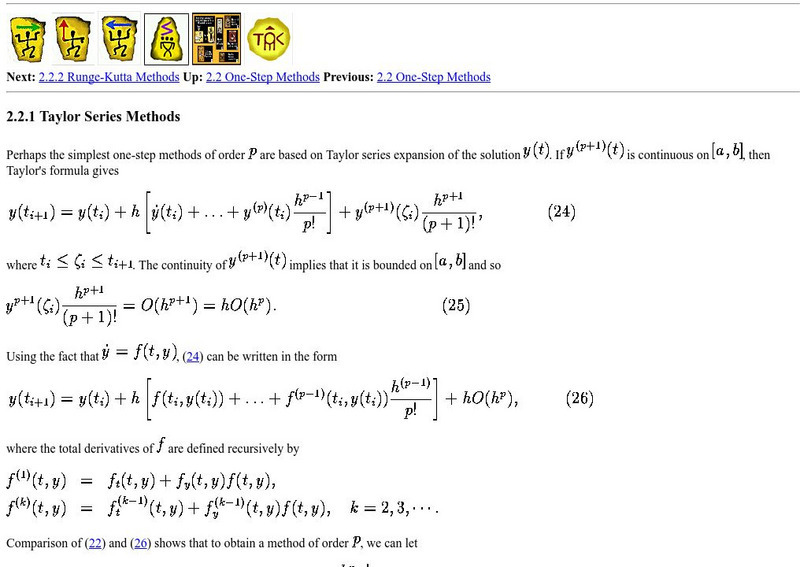REMC Association of Michigan
Remc Association of Michigan: 21 Things4 Students: 21. Computational Thinking
Computational thinking can be used to take a complex problem, understand what the problem is and develop possible solutions to solve or explain it. In these six Quest, students will learn about the four stages of computational thinking:...
Other
Medium: Decision Trees Algorithms
Decision trees are used for both classification and regression problems, this story we talk about classification.
Khan Academy
Khan Academy: Where to Go From Here
After learning about algorithms, find out what to learn next.
Khan Academy
Khan Academy: A Guessing Game
This Khan Academy resource is an article about a game that gives you an idea of how different algorithms for the same problem can have wildly different efficiencies. The computer is going to randomly select an integer from 1 to 15....
Other
University of Birmingham: "Top Down" and "Bottom Up" Design
Describes bottom-up design methodology and differentiates it from top-down procedures. Contains some questions to help choose a particular methodology.
Other
Science Direct: Recent Advances on Two Dimensional Bin Packing Problems
This paper surveys recent advances obtained for the two-dimensional bin packing problem, with special emphasis on exact algorithms and effective heuristic and metaheuristic approaches.
Mathigon
Mathigon: Graphs and Networks: The Travelling Salesman Problem
This lesson focuses on the traveling salesman problem which involves finding paths through a city without backtracking. While no algorithm has been found to do that for all cities, there are algorithms that help somewhat. They are...
Khan Academy
Khan Academy: Yann Dauphin, Researcher and Bass Player
Hi, I'm Yann Dauphin. I design and code artificial intelligence algorithms that can learn from examples. They are like programs that can program themselves. I spend most of my time discussing new ideas for algorithms, coding in Python,...
Texas Instruments
Texas Instruments: Numb3 Rs: The Dating Game
Based off of the hit television show NUMB3RS, this lesson shows students an algorithm to find the day on which any date in the past or future, has or will land. The lesson begins with a manual "hammering out" of a few specified dates by...
Northeast Parallel Architectures Center, Syracuse University
Npac Reu Program: Taylor Series Methods
This Northeast Parallel Architectures Center at Syracuse University site proivdes a general overview of the Taylor series methods, including a focus on the Taylor series algorithm.
University of Auckland School of Computer Science
Morris: Sequential Searches
A description of locating data in a collection with a sequential search algorithm.
Cut the Knot
Cut the Knot: Lattice Multiplication
Have you heard of the 13th century mathematician, Leondardo Fibonacci? See examples of his concept of a lattice multiplication algorithm. Several example problems, including an interactive one where students can change the factors, are...
Other
Long Division Worksheets
Give these worksheets to students to practice division using the standard algorithm.
Alabama Learning Exchange
Alex: Multiplication My Way
In this lesson, students will explore the US Algorithm Method of multiplication using a unique way of describing it known as the Turtlehead Method. Students will collaboratively work together to complete story problems using the US...
Alabama Learning Exchange
Alex: Area Model of Multiplication Base 10 Manipulatives
Students will use base 10 manipulatives to build a rectangular array to represent double digit multiplication. Students will make the connection between the standard algorithm and the rectangular array.This lesson plan was created as a...
E-learning for Kids
E Learning for Kids: Math: Llama Farm: Addition and Subtraction
On this interactive site students learn to solve subtraction problems using a formal algorithm and to apply place value concepts.
Texas Instruments
Texas Instruments: Numb3 Rs: Dna Sequencing Alignment
Based off of the hit television show NUMB3RS, this lesson has student find the level of similarity between two different-length strands of DNA. Connections to Djikstra's algorithm are mentioned, and students learn more to follow careful...
Texas Instruments
Texas Instruments: Numb3 Rs: "Uncertainty Principal" Checksum
This lesson plan introduced students to algorithms in the context of bank routing numbers (printed on checks). Students learn that the final digit in the routing number serves a specific purpose, and find such digits so that the routing...
Texas Instruments
Texas Instruments: Numb3 Rs: Shifting Cells
Based off of the hit television show NUMB3RS, this lesson introduces students to the concept of algorithms. Students are at first given a string of cells (one-dimensional), and then told to iterate the cells according to a couple basic...
Texas Instruments
Texas Instruments: Numb3 Rs: Sir Models
Based off of the hit television show NUMB3RS, this lesson helps students understand how diseases, epidemics, etc. are tracked by health organizations. Using the SIR (susceptible, infected, recovered) model, students track the number of...
McMaster University
Mc Master University: The Growth of Function
An in-depth presentation of the algorithm efficiency measurement tool known as Big-O.
Other
Sequence Manipulation Suite
A collection of JavaScript programs for generating, formatting, and analyzing short DNA and protein sequences. It is commonly used by molecular biologists, for teaching, and for program and algorithm testing.
Other
Blue Centauri Consulting: Readability Analyzer
This writing sample analyzer takes a sample of writing and calculates the number of sentences, words, and characters in the sample. As it's calculating these statistics it makes estimates as to how many syllables are present in each...
John Wiley & Sons
Wiley: Pseudocode Example: Game of Monopoly
An easy example of pseudocode, the language for designing algorithms, for playing the game of monopoly.
Other popular searches
- Numerical Algorithms
- Division Algorithm
- Multiplication Algorithms
- Addition With Algorithms
- Addition Algorithms
- Subtraction Algorithms
- Standard Algorithm
- Math With Algorithms
- Partial Products Algorithm
- Partial Sums Algorithm
- Adding Integers Algorithm
- Dividing Algorithm




















